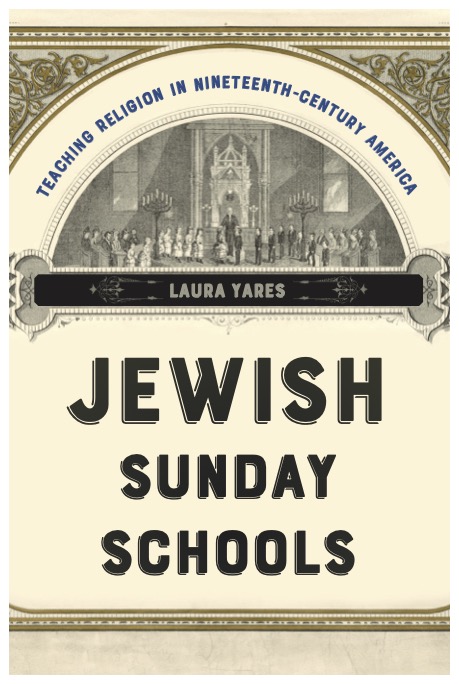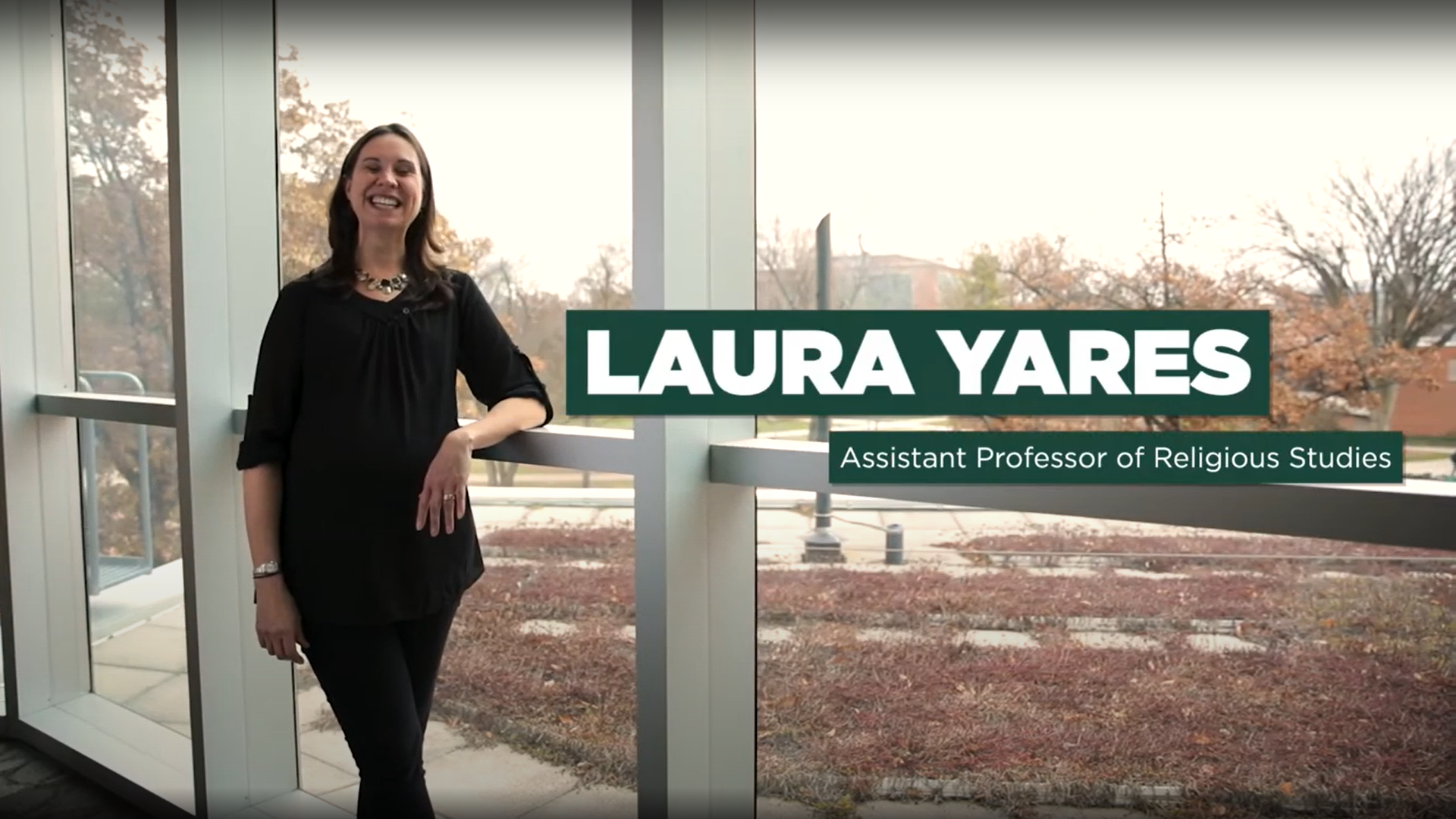Laura Yares
(She/Her)
C728 Wells Hall
619 Red Cedar Rd
East Lansing, MI 48824
FacultyReligious StudiesJewish Studies
Associate Professor
Judaism; Religion in North America; Religion and Education; Religion and Non-Profits;
Biography
Laura Yares is interested in the different ways that people learn about religion, and the different ways that ideas about religion are circulated and created within educational contexts. Her research focuses on history, culture, and education in North America, particularly in Jewish contexts.
Her first book Jewish Sunday Schools: Teaching Religion in Nineteenth Century America (NYU Press, 2023) was a finalist for a 2023 National Jewish Book Award, and a finalist for a 2024 American Academy of Religion Book Award. It shows that education was a central means through which nineteenth century American Jews sought to reimagine Judaism in the modern, Protestant inflected terms of religion. Jewish Sunday Schools focuses closely on issues of women and gender, and on the role of women’s volunteerism in sustaining religious life during the nineteenth century. It also plays close attention to material culture, and to the ways that consumer markets shaped the development of Jewish education.
Her second book engages these interests in popular and consumer culture through a different methodological lens. Artful Education: Learning about Judaism in Leisure Time (co-authored with Sharon Avni, CUNY) is under contract with NYU Press, with expected publication in 2026. It utilizes contemporary ethnographic methods to document the different ways that Jews and non-Jews learn about Judaism and Jewishness in the context of leisure time engagements with cultural artistic sites, including museums, television, music, theater, and web-based performances.
She is currently working on two new book projects. Outside In: Converts to Judaism and the Shifting Boundaries of American Jewish Belonging is a history of conversion to Judaism in North America. It charts historical moments of ambivalence towards conversion and converts, arguing that they illuminate broader ideological and communal tensions in American Jewish life. A second book project, The Objects of Religious Studies: Histories of Acquisition, is an object-centered study of religious collections held in academic institutions. It explores the acquisition histories of religious objects, images, and manuscripts, arguing that acquisition has been shaped changing ideas about religion as an object of scholarly study.
She regularly teaches courses on the history of Judaism, Judaism in North America, Theories and Methods in Religious Studies, and Introduction to Word Religions. Other courses include offerings for the Religious Studies department’s Religion and Non-Profits undergraduate, M.A. and certificate programs. She has offered independent studies and special topics courses for students in religion, history, and education, and enjoys working with students who are interested in researching religion in North America, Jewish history, nineteenth-century American history, topics related to religion and education, and religion and nonprofits.
With Mary Juzwik (College of Education), and Deborah Margolis (MSU Libraries), she leads a year-long professional development program for Michigan 8-10th grade English Language Arts and Social Studies teachers who teach courses and texts related to the Holocaust and other genocides. See http://hgcf.commons.msu.edu/ for details.
Laura Yares is a proud first generation college student, and is always happy to meet other first-gen college students at MSU.
PRINCIPAL SCHOLARLY INTERESTS: Jewish education; American Judaism; religion in North America; religion and non-profits; religion and gender; religion and museums.
Projects
Artful Education: What Jews and Non-Jews Learn about Judaism through Jewish Cultural Arts
Explores Jewish cultural arts as sites of informal, episodic education for Jewish and non-Jewish viewers. A book project featuring five cultural arts case studies: The Weitzman National Museum of American Jewish History; web broadcast Saturday Night Seder; musician Sarah Aroeste; TV show Shtisel; and Broadway plays Parade, Leopoldstadt and The Wanderers.
Jewish Sunday Schools: Teaching Religion in Nineteenth-Century America
Charts how changes to Jewish education in the nineteenth century served as a site for the wholescale reimagining of Judaism itself
Media Mentions
Shavuot: The Jewish holiday that became all about children
The Conversation
May 22, 2023
How Shavuot became reimagined as a grand celebration of children in nineteenth-century Jewish America
For theatergoers at Broadway’s recent spate of Jewish shows, attendance is a form of witness
Jewish Telegraphic Agency (JTA)
April 13, 2023
"By learning Jewish history on Broadway, audiences are paradoxically able to distance themselves from it, simply by knowing too much."
How Thanksgiving helped Jews carve out a piece of the American story
Jewish Telegraphic Agency
November 22, 2021
Jewish Learning through Cultural Arts
Tulane University Grant Center for the American Jewish Experience
September 29, 2021
Awards and Honors
Humanities and Arts Research Program (HARP) Grant
MSU College of Arts and Letters
2023
$24,213 grant to support completion of a book manuscript
Courses
REL 101 Exploring Religions
This course explores the rich diversity of the world’s religious traditions, focusing particularly on the ways that various religious traditions create communities oriented around practices, worldviews, and ideas of the sacred. We will ask whether it is possible to define religion as a general concept, explore the histories and practices of 6 religious traditions, and inquire about the relevance of religion in the contemporary world. We will pay attention to sacred texts, concepts of the divine, statements of belief, the use of memory and history, and the efficacy of ritual. This course will operate from the assumption that religion is an indelible element of human culture. Religion is part of what makes human existence rich and complex.
REL 310: Judaism
This course explores the history of Jews and Judaism. Beginning with the earliest texts of the Hebrew Bible, our course will begin in the Ancient Near East, and take us to Israel, Iran, Spain, North Africa, and Europe, before landing in the contemporary United States. The paradigmatic story of the Jewish people, a story that is told each year during the Passover Seder, is the story of the exodus from Egypt. Our course will build towards a final assignment in which you will analyze a Haggadah (the ritual text of the Passover seder) from the MSU library’s special collection. In this course, and through this final assignment in particular, you will learn about the ways that Jews have negotiated their own understandings of Jewish ritual, Jewish history, and Jewish religion, and have told stories about belonging, liberation, freedom, and responsibility.
REL 411 Modern Jewish Thought
The modern world in which we live grants us freedoms and opportunities that would have been unimaginable to those living in previous generations. But for representatives of religious traditions like Judaism, modernity has also been a source of significant challenges – even crises – that would likewise have been unimaginable in pre-modern times. This course will explore the myriad forms of Jewish philosophy, mysticism, and political thought that have emerged out of the struggles between reason and faith, between autonomy and religious authority, and between secular and religious values, that mark the modern religious experience. We will ask: What paths have been opened up by Jewish philosophers or mystics living in the modern world that lead to the knowledge and experience of divinity which they seek? What aspects and events of the modern world have most challenged and transformed the faith and the identity of modern Jewish thinkers? Is it possible to find meaning in the ideas and practices of Judaism if one no longer accepts the laws of the Bible and Talmud as divinely authoritative? As we explore such questions over the course of the semester, we will discover how Jewish thinkers in modernity have redefined the meaning of Judaism.
REL 414 Jewish Identity
The course investigates the multiple and often contradictory identities of contemporary American Jews. Judaism in America is experienced as, among other things, a religion, as varieties of ethnicity and heritage, a daily way of life, a system of ethics, and a communal memory of the Jewish past. Utilizing narrative theories of identity construction, in this course students will examine different vocabularies that Jews use to talk about the ways that they are Jewish. This course proceeds from two fundamental assumptions: (1) that identities are fluid, dynamic, and constantly in production (2) that discourses on religion, race, secularity, culture, and gender intersect to shape their production. In other words, there is no single Jewish identity – but there are many Jewish identities. This course will introduce students to critical readings and primary sources that attest to the ways that varieties of Judaism are constructed and reconstructed in contemporary America.
Publications
“Exit Through the Gift Shop: Affective Learning and Millennial Jewish Consumer Culture at the National Museum of American Jewish History,” Material Religion 18: 2 (2022), 161-181.
Chevruta in the Museum,” in Diane Tickton Schuster, ed., Portraits of Adult Jewish Learning, Eugene: Wipf and Stock (2022), 14-22.
“Saturday Night Seder and the Affordances of Cultural Arts During COVID-19,” co-author Sharon Avni, Contemporary Jewry, 41:1 (2021), 3-22.
“Professional Development for Disruptive Jews: The Lippman Kanfer Sensibilities Project as a Learning Agenda for Jewish Professional Education,” Journal of Jewish Education, 85: 4 (2019): 408-428
“Say it with Flowers: Shavuot, Confirmation and Ritual Reimagination for a Modern Age,” Shofar, 35:4 (2017): 1-20
“Jewish Education in the Age of the Rediscovery of the Soul,” Journal of Jewish Education, 82:2 (2016): 117-131
“Blasphemy and the Negotiation of Religious Pluralism in Britain,” Politics and Religion, No. 2, Volume 4 (2010): 237-255
“A Tale of Two Catechisms: Education, Generational Conflict, and Geographical Division in Nineteenth-Century America,” American Jewish History, Vol. 106, No.3, July 2022, 283-303

